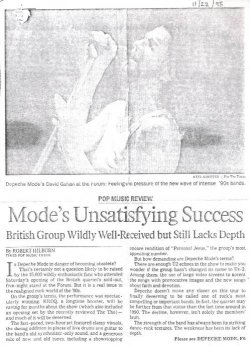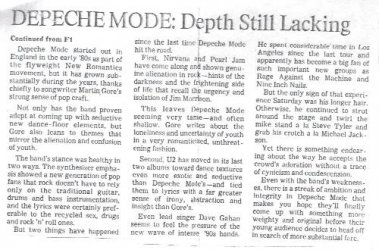Mode's Unsatisfying Success
[L.A. Times, 22nd November 1993. Words: Axel Koester.]


Is Depeche Mode in danger of of becoming obsolete?
That’s certainly not a question likely to be raised by the 15,000 wildly enthusiastic fans who attended Saturday’s opening of the British quartet’s sold-out, five-night stand at the Forum. But it is a real issue in the realigned rock world of the ‘90s.
On the group’s terms, the performance was spectacularly winning. KROQ, a longtime booster, will be raving for months about the show (which also included an opening set by the recently reviewed The The) – and much of it will be deserved.
The fast-paced, two-hour set featured classy visuals, the daring addition in places of live drums and guitar to the band’s old synthesizer-only sound, and a generous mix of new and old tunes, including a showstopping encore rendition of “Personal Jesus”, the group’s most appealing number.
But how demanding are Depeche Mode’s terms?
There are enough U2 echoes in the show to make you wonder if the group hasn’t changed its name to Us-2. Among them: the use of large video screens to accent the songs with provocative images and the new songs about faith and devotion. [1]
Depeche doesn’t move any closer on this tour to finally deserving to be called one of rock’s most compelling or important bands. In fact, the quartet may be further from that status than the last time around in 1990. The decline, however, isn’t solely the members’ fault. [2]
The strength of the band has always been its striking dance-rock textures. The weakness has been its lack of depth.
Depeche Mode started out in England in the early ‘80s as part of the flyweight New Romantics movement, but it has grown substantially during the years, thanks chiefly to songwriter Martin Gore’s strong sense of pop craft.
Not only has the band proven adept at coming up with seductive new dance-floor elements, but Gore also leans to themes that mirror the alienation and confusion of youth.
The band’s stance was healthy in two ways. The synthesizer emphasis showed a new generation of pop fans that rock doesn’t have to rely only on the traditional guitar, drums and bass instrumentation, and the lyrics were certainly preferable to the recycled sex, drugs and rock’n’roll ones.
But two things have happened since the last time Depeche Mode hit the road.
First, Nirvana and Pearl Jam have come along and shown genuine alienation in rock – hints of the darkness and the frightening side of life that recall the urgency and isolation of Jim Morrison.
This leaves Depeche Mode seeming very tame – and often shallow. Gore writes about the loneliness and uncertainty of youth in a very romanticized, unthreatening fashion.
Second, U2 has moved in its last two albums toward dance textures even more exotic and seductive than Depeche Mode’s – and tied them to lyrics with a far greater sense of irony, abstraction and insight than Gore’s.
Even lead singer Dave Gahan seems to feel the pressure of the new wave of intense ‘90s bands. He spent considerable time in Los Angeles since the last tour and apparently has become a big fan of such important new groups as Rage Against The Machine and Nine Inch Nails.
But the only sign of that experience Saturday was his longer hair. Otherwise, he continued to strut around the stage and twirl the mike stand a la Steve Tyler and grab his crotch a la Michael Jackson.
Yet there is something endearing about the way he accepts the crowd’s adoration without a trace of cynicism and condescension.
Even with the band’s weaknesses, there is a streak of ambition and integrity in Depeche Mode that makes you hope they’ll finally come up with something more weighty and original before their young audience decides to head off in search of more substantial fare.
[L.A. Times, 22nd November 1993. Words: Axel Koester.]
A thought-provoking concert review doubling as an examination of Depeche Mode's place in 1993's music scene. The review is generally disappointed with the subject matter of Martin's songs and has his doubts about the band's relevance - yet the review is far from damning and strives to be fair. In fact, the author's broadly sympathetic tone in places seems almost regretful.
" Gore writes about the loneliness and uncertainty of youth in a very romanticized, unthreatening fashion. "
Many thanks to Michael Rose for kindly supplying a scan of this article.


Is Depeche Mode in danger of of becoming obsolete?
That’s certainly not a question likely to be raised by the 15,000 wildly enthusiastic fans who attended Saturday’s opening of the British quartet’s sold-out, five-night stand at the Forum. But it is a real issue in the realigned rock world of the ‘90s.
On the group’s terms, the performance was spectacularly winning. KROQ, a longtime booster, will be raving for months about the show (which also included an opening set by the recently reviewed The The) – and much of it will be deserved.
The fast-paced, two-hour set featured classy visuals, the daring addition in places of live drums and guitar to the band’s old synthesizer-only sound, and a generous mix of new and old tunes, including a showstopping encore rendition of “Personal Jesus”, the group’s most appealing number.
But how demanding are Depeche Mode’s terms?
There are enough U2 echoes in the show to make you wonder if the group hasn’t changed its name to Us-2. Among them: the use of large video screens to accent the songs with provocative images and the new songs about faith and devotion. [1]
Depeche doesn’t move any closer on this tour to finally deserving to be called one of rock’s most compelling or important bands. In fact, the quartet may be further from that status than the last time around in 1990. The decline, however, isn’t solely the members’ fault. [2]
The strength of the band has always been its striking dance-rock textures. The weakness has been its lack of depth.
Depeche Mode started out in England in the early ‘80s as part of the flyweight New Romantics movement, but it has grown substantially during the years, thanks chiefly to songwriter Martin Gore’s strong sense of pop craft.
Not only has the band proven adept at coming up with seductive new dance-floor elements, but Gore also leans to themes that mirror the alienation and confusion of youth.
The band’s stance was healthy in two ways. The synthesizer emphasis showed a new generation of pop fans that rock doesn’t have to rely only on the traditional guitar, drums and bass instrumentation, and the lyrics were certainly preferable to the recycled sex, drugs and rock’n’roll ones.
But two things have happened since the last time Depeche Mode hit the road.
First, Nirvana and Pearl Jam have come along and shown genuine alienation in rock – hints of the darkness and the frightening side of life that recall the urgency and isolation of Jim Morrison.
This leaves Depeche Mode seeming very tame – and often shallow. Gore writes about the loneliness and uncertainty of youth in a very romanticized, unthreatening fashion.
Second, U2 has moved in its last two albums toward dance textures even more exotic and seductive than Depeche Mode’s – and tied them to lyrics with a far greater sense of irony, abstraction and insight than Gore’s.
Even lead singer Dave Gahan seems to feel the pressure of the new wave of intense ‘90s bands. He spent considerable time in Los Angeles since the last tour and apparently has become a big fan of such important new groups as Rage Against The Machine and Nine Inch Nails.
But the only sign of that experience Saturday was his longer hair. Otherwise, he continued to strut around the stage and twirl the mike stand a la Steve Tyler and grab his crotch a la Michael Jackson.
Yet there is something endearing about the way he accepts the crowd’s adoration without a trace of cynicism and condescension.
Even with the band’s weaknesses, there is a streak of ambition and integrity in Depeche Mode that makes you hope they’ll finally come up with something more weighty and original before their young audience decides to head off in search of more substantial fare.
[1] - Right. Two things here: (a) both U2 and and Depeche Mode had been using the same person - Anton Corbijn - for their stage set design. I think if we were going to accuse Anton of a lack of originality, we'd need to point to more similarities than the use of big screens, which are surely a courtesy to the people at the back of the arena if nothing else. Which brings us nicely on to: (b) right from the start, the band had been eager to make the show more visual, as having three members tied to their keyboards really means a one-man show and not much to look at.
[2] - A lot of misgivings have been expressed - at the time and since - about Songs Of Faith And Devotion and whether the band lost their way a little amidst Dave's pertinent attempts to revise their style. By the time of Ultra (1996-97) the band seem to have started to consider this themselves: "Ultra" commented Dave in this interview at the time, "is more of a natural follow-on, really, to Violator".
Last edited:
